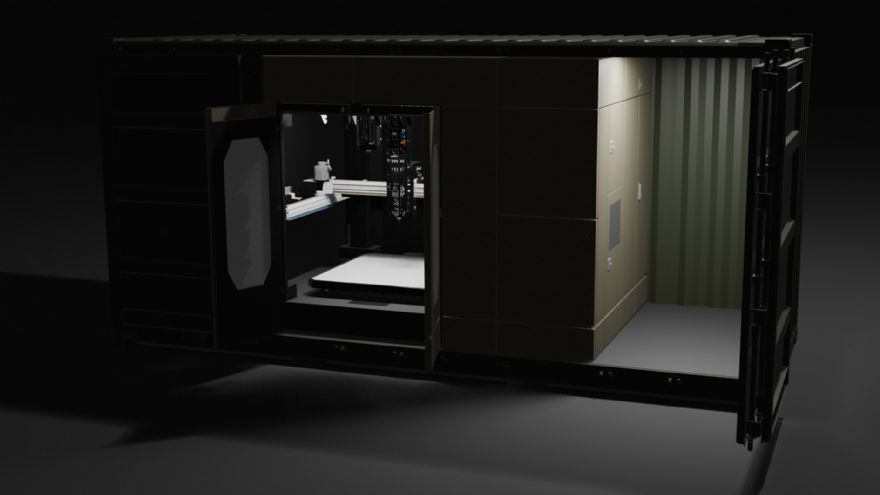
Exeter-based
Rapid Fusion, one of the UK’s leading technology specialists is set to launch Cerberus, a new deployable hybrid manufacturing system that can be set up in just 25min. The company behind the hugely successful Apollo and Medusa robots, is promising to change the way production parts are made in remote areas with the unveiling of Cerberus at
Formnext in Frankfurt next week (18-21 November).
This latest innovation represents purpose-built containerised manufacturing, with ‘every millimetre designed for rapid deployment, rugged operation, and uncompromising performance’. It is intended for use in isolated areas, from arctic oil platforms and desert forward bases to disaster zones and remote construction sites.
Martin Jewell, Rapid Fusion‘s chief technical officer, said: “We had been in talks with a number of defence companies about the possibility of developing a system that is capable of producing military grade components anywhere in the world. Being able to deploy quickly was a key requirement so that got us thinking. We have taken the functionality and technology of Medusa and adapted it into a new system that is containerised and can be set up anywhere, and in just 25min.”
He continued: “The initial feedback on Cerberus has been phenomenal and we believe we have a hybrid manufacturing machine that can make components used in rescue drones, safety critical parts for oil and gas and replacements bits for vehicles operating in intense conditions. We will be demonstrating it for the first time at Formnext, with the opportunity for companies to pre-order for when production starts next month.”
Advanced composite productionCerberus, which has been designed to be container-native, provides access to a build volume of 1200mm
3 with a pellet throughput of up to 17kg per hour and 3kW of continuous spindle power — ideal for both 3-D printing and CNC machining. It thrives on supply chain independence, where re-supply could be in months and not days. With this in mind, the system offers bulk material compatibility so any local polymers can be used, benefits from dual independent heads to ensure zero downtime and operates up to 500°C for advanced composite production.
Getting started couldn’t be easier. A single-power five-pin commando socket is all that is required, with Cerberus coming with its own self-levelling system to compensate for uneven terrain and automated start-up sequence for system verification and calibration.
Mr Jewell, who completed three tours of Afghanistan as part of a 10-year career in the Royal Engineers, added: “The system has been designed to deliver reliable performance in demanding, high-tempo environments - always built with operational resilience in mind. We have developed several modular enhancements that buyers can choose from to make the system energy independent, achieve compressed air where none is available and access intelligence anywhere through Bob - our AI-powered operating system.”
Rapid Fusion’s CEO Jake Hand concluded: “There are lots of deployment scenarios where Cerberus can make a real difference. We initially looked at how it would work in producing replacement parts for military and defence or creating custom tooling and fixtures. It then broadened out to disaster response and the ability to make medical supplies quickly, and eliminating helicopter logistics for polymer parts used in oil and gas. The reality is there are many more scenarios where our technology can be used.
“
Formnext will be a great place to debut Cerberus and we cannot wait for it to enter series production and begin helping countries save lives and protect their communities.”